20 January 2025
The Cape Town Labour Corps Memorial: A New Chapter in Commemoration
The Cape Town Labour Corps Memorial marks a new chapter for Commonwealth War Graves Commission war memorials. Operational Manager (Non-Commemorations) David McDonald guides us through the journey of its creation.
The Cape Town Labour Corps Memorial
A new chapter…

Image: The Cape Town Labour Corps Memorial
Whilst the story of creating the Cape Town Labour Corps Memorial is over 10 years in the making, the story of the men it commemorates has been ongoing for over 100 years.
The unveiling of the memorial on the 22nd January 2025 does not bring this story to a close, but it opens a new chapter: a new chapter where the lives and participation of men from often overlooked South African communities during the First World War are more widely acknowledged and celebrated.
It is our collective hope that this project will ensure that the story of these men will now be more accessible to the general public in South Africa, and around the world.
In the following article, I have attempted to present a timeline of the memorialisation project.
For the most part, I have opted not to specifically name individuals who have been involved as naming one person, would typically mean leaving out 10 other people who contributed immensely.
The project would not have been possible without the immeasurable contributions of our partners at the City of Cape Town.
Uncovering the names
In 2018 the Commonwealth War Graves Commission agreed that a new memorial would be required in South Africa to commemorate over 2000 new casualty records of individuals who have not previously been formally commemorated.
A great number of these records came from the work of the South African War Graves Project who had been uncovering new records since 2015. We are incredibly grateful for their efforts.
It came to be understood that the vast majority of these men had served in Military Labour Regiments, who – most likely due to the historical and political context in which they served during the war – had been significantly underrepresented not only in terms of commemoration, but also in terms of their wider acknowledgement in the traditional histories and narratives of South Africa’s participation during the First World War.
Selecting a site for the memorial

Image: The Delville Wood Memorial Garden set against the backdrop of Cape Town’s famous Table Mountain
In February 2019, discussions began with a wide range of South African stakeholders on where a suitable site for such a memorial might be.
The key conclusions from these early discussions were that any new memorial must be distinctly South African and meaningful to local people.
There was also a strong need for an external relations and education programme to accompany the project.
It was crucial to CWGC that any new site was free to access, and that the design was scalable so that it could easily be increased in size if new casualty records were discovered at a later date.
But where do you site a national memorial, when the men who are being commemorated had enlisted from every corner of South Africa?
Consideration was given to several locations across the country, but a theme quickly emerged in that although the men were from a range of backgrounds and geographies, most would have passed through Cape Town or Durban as a point of departure for their journey by sea to serve in East Africa or further afield.
Discussions with the local authorities in Cape Town began in June that year, and the proposal to create a new memorial to South Africa’s previously un-commemorated WW1 labourers was met with enthusiasm. It was at this point our project team began working with the City of Cape Town, a relationship that would become crucial to the project.
In early 2020 after assessing a number of options, the City of Cape Town suggested that they had the ideal site in mind.
The Delville Wood Memorial Garden, within the historic Company’s Garden was an existing place of commemoration which had been designed by non-other than Sir Herbert Baker: A figure who will be known to those who are interested in the origins of CWGC.
At the centre of the garden is a smaller version of the Delville Wood Memorial in France (also designed by Baker), which serves as the National Memorial of the South African Overseas Expeditionary Force who died during the First World War.

Image: The agreed site for the new memorial would be the grassed quadrant nearest the Queen Victoria Street entrance, as well as the raised wooded terrace to the rear which was previously unused and difficult to maintain
The Delville Wood Memorial Garden also contains several other First World War memorials, including an Artillery Memorial and individual monuments to prominent military figures of the time such as Jan Smuts and Major Lukin.
Although the site is the venue for a large remembrance ceremony every year, with active veterans’ associations from many communities, the memorial landscape of the gardens was previously only representative of a small section of South Africans' participation in the conflict.
Siting a new memorial in this space to commemorate men from South Africa’s Black and non-White communities (who almost exclusively make up the Labour Regiments of the time) would complete the memorial landscape of the gardens and provide a place where all South Africans could remember the war dead together in one place.
March 2020: Designing a South African Memorial
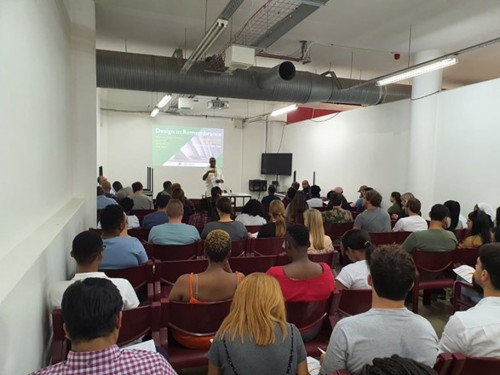
Image: Dr Finzi Saidi introduces architecture students to the design brief for the CWGC student project
Whilst CWGC had constructed several other memorials in the last 10 years, these had typically followed the architectural blueprints of our predecessors after the First and Second World Wars.
Often built in Portland stone, or utilising bronze panels these materials are not local to South Africa or representative of the South African communities whom we wished to commemorate with the creation of this Cape Town war memorial.
As a project team there was a wish to explore how South Africa’s best creatives could interpret the opportunity to create a modern South African memorial, and if this could be done whilst retaining something of the CWGC DNA to ensure that any new site could be recognisable and on par with the high standards our historical sites are known for.
Posing ourselves the question – “what would a contemporary South African Memorial look like?”, we undertook a student project with the Graduate School of Architect at the University of Johannesburg.
As part of their coursework, 12 groups of students collaborated to submit concept designs using a real-life client brief following a series of site visits to existing CWGC cemeteries and lectures from CWGC and Academic Staff.
The response from the students was nothing short of exceptional, and it was evident from the quality of the submissions and presentations that the brief and significance of telling the story of the South African Labourers was one which the creative community agreed should be told.
The student project was brought to a close with an exhibition at the university, showcasing the students' work. The exercise left us feeling inspired and thoroughly convinced that we could create something uniquely South African and modern which also spoke to the architectural excellence and heritage of CWGC.
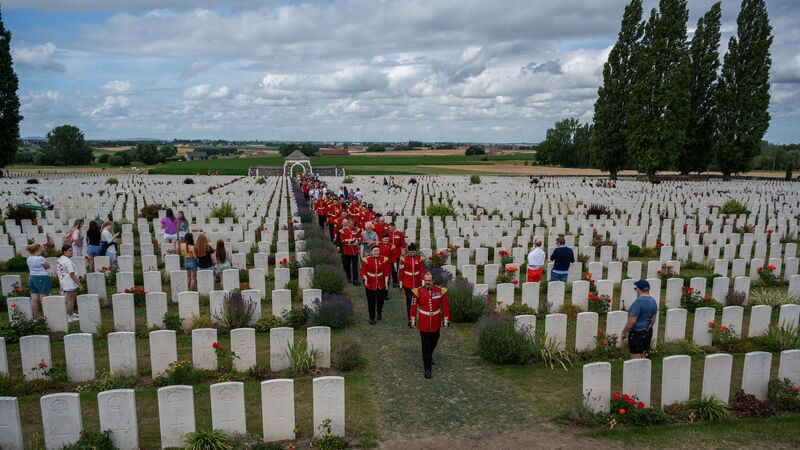
Want more stories like this delivered directly to your inbox? Sign up for our newsletter for regular updates on the work of Commonwealth War Graves, blogs, event news, and more.
Sign UpNovember 2020: Working towards Heritage Approvals
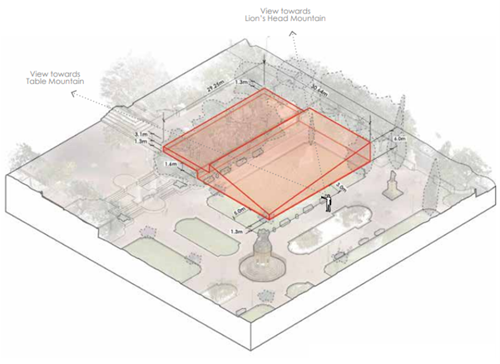
Image: Isometric drawing illustrating the extent of the maximum possible area of intervention for the memorial design (Meyer & Associates Architects & Urban Designers)
The Delville Wood Memorial Garden is a Grade II provincial heritage site. Creating a new memorial in such a historic location is a once-in-a-lifetime opportunity, but one that comes with many considerations that must be carefully navigated.
Given the complex nature of the memorial landscape here, where several existing memorials represent specific communities from South African history, a new memorial to a group of men who were previously not acknowledged must carefully consider the new memorial’s place and relationship within its wider setting.
Discussions with stakeholders agreed that the memorial should not be deferential to those around it, it should stand proudly and through its architecture challenge the existing colonial symmetry and materiality of the gardens.
However, from a heritage perspective, any such intervention must also be considerate of the historical significance of the setting and should not be in any way detracting.
The desire of stakeholders to create a new, more complete memorial landscape in the gardens, where all who served and died can be remembered collectively was to be enshrined in the design brief.
Working with local Cape Town Architects and heritage experts, the project team carefully created a set of guidelines which would form the basis of a design brief but crucially would also be put to the public for comment prior to be submitted to the provincial heritage authorities (Heritage Western Cape) for final consideration and approval.
The maximum area of intervention was proposed by the client team as the maximum footprint and height that a memorial design could be in order to create a meaningful memorial, but also respect the existing heritage landscape and associated features.
After several months of public workshops and feedback sessions, the heritage report and ‘design guidelines’ were submitted to Heritage Western Cape and approved in-principle on 14th March 2022.
August 2022: Architectural Competition

Image: The winning scheme by Dean Jay Architects - model by Boyd & Ogier
Enriched by our architectural engagements with the students at the University of Johannesburg, we were convinced that the opportunity to design this memorial must be opened to the widest possible audience of South Africa’s creative talents.
A national design competition was formulated which would allow creatives to submit concept designs provided that the team included a registered South African architect, and the proposal complied with the heritage guidelines agreed with Heritage Western Cape.
A panel of experts consisting of practicing architects, academics, heritage specialists and urban planners were appointed to be the competition judges. I was privileged to be a part of this process and represent CWGC with the daunting task of trying to ensure that the DNA of CWGC’s heritage and infamous sites was present in the chosen scheme.
A resoundingly positive response was received from the architectural community, with a total of 58 compliant designs submitted to the jury for consideration. Over 2 days of deliberation, the submissions - which were judged anonymously – were whittled down to a top 10, then a top 3, and finally a winner. When the final 3 submissions were laid out to the group, the choice of winner was unanimous.
Dean Jay Architects of Durban were announced as the winners of the architectural competition at the Cape Institute of Architecture. An emotional Dean Jay was there in person to hear the news.
As an esteemed architect with over 35 years’ experience, but also a military veteran himself, Dean expressed his enormous pride at having won such a commission given the projects aims of honouring forgotten service personnel.

Image: An architectural render from the centre of the memorial, looking onto the Delville Wood Memorial (Dean Jay Architects)
The winning scheme featured individually engraved timber posts to represent each of the fallen.
Collectively 1772 individual markers would evoke a forest ravaged by war, and at the same time offer the visitor a sense of the scale of the losses.
The memorial would be experiential, encouraging the visitor to move through it and contemplate the story of the men who had for too long been forgotten.
The scheme was elegant, dignified and importantly versatile as new posts could be added (or removed) if further information of additional casualties was to come to light.
More public engagement – including descendants

After the selection of the winning design, it was necessary to undertake a second round of public participation, to ensure that our many project stakeholders had the chance to comment on the chosen approach to memorialisation.
This process would take several months and was a legal requirement before we would be able to submit plans to the Heritage and Planning authorities.
In the meantime, an exciting mission came to fruition – would it be possible to trace some of the descendants of the men who would be commemorated on the new memorial?
Working closely with our local experts, we established a project to follow up leads across the Eastern Cape. Over three days in February 2023 a team of three – our cinematographer, environmental consultant and isiXhosa speaking oral historian – undertook a project to visit villages and townships where it was believed the families of these men might still reside.
It was a deeply moving exercise that was only possible after months of family tree research. The team were required to have sensitive conversations with families who, in many cases, had never known the full story about what happened to their loved ones.
During this period, Dean Jay Architects and our engineers were working busily on the detailed design and testing of materials.
February 2024: Construction
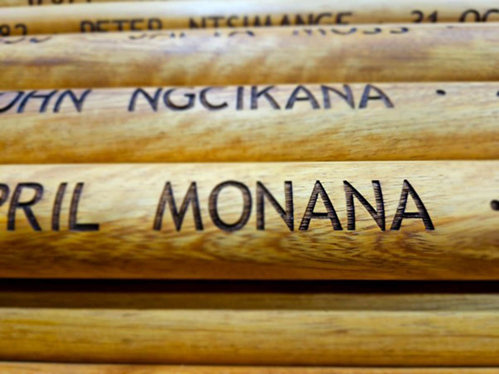 Image: Freshly engraved Iroko Posts, the combined efforts of Kaljon and Etch Africa in Durban
Image: Freshly engraved Iroko Posts, the combined efforts of Kaljon and Etch Africa in Durban
Construction of the new Cape Town memorial began in February 2024, followed by the official official groundbreaking ceremony which included The Mayor of the City of Cape Town Geordin Hill-Lewis and Sidney Maliwa, the Descendent of Magwayi Maliwa one of the servicemen who will be commemorated on the memorial.
Construction work was undertaken by local Cape Town firm, DNL properties, and began with the careful excavation of the site, and construction of the foundations which form the basis of the memorial.
In parallel working with the CWGC Drawing office in the UK, Dean Jay Architects were busily working with local firms near their offices in Durban, to manufacture the Iroko Memorial posts and the laser engraving of the names.
With a memorial design that features timber posts of differing heights, a unique drawing had to be created for each casualty's’ name, and checked several times for accuracy.
For a period the project was unexpectedly delayed due to a prolonged wet season which made work on the ground impossible. Patience was required as the rains never seemed to end, but it was rewarded when work resumed a few weeks later.
A happy Kaljon team in Durban packed up the consignment of completed memorial posts for delivery to Cape Town in May 2024.
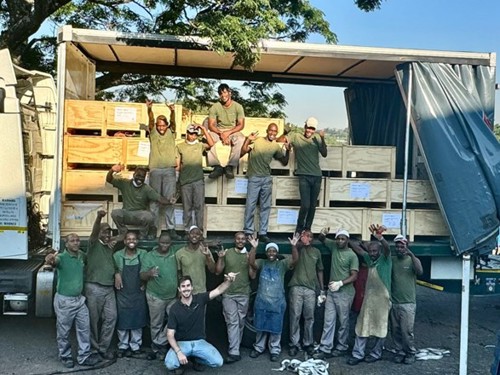 Image: A proud Kaljon team in Durban pack up the shipment of Iroko Memorial posts for delivery to site in Cape Town
Image: A proud Kaljon team in Durban pack up the shipment of Iroko Memorial posts for delivery to site in Cape Town
Undoubtedly the most challenging element of the work was set to begin with the careful alignment of the 1772 timber posts, to ensure that every post was not only in its correct position, but also that they could be aligned as best as possible to ensure that the design intentions were realised.
Timber being a natural material, poses numerous challenges in this regard, but the desire was to ensure that they were sufficiently aligned as to give the sweeping effect of the memorial rising up to meet the treelines to rear of the site was essential.
After 10 months, practical completion was achieved on the 30th October 2025. This was a huge milestone for the project and a moment where it felt the finish line was now in sight.
However, there was no time to be complacent, as the date for the unveiling had been set for the 22nd of January and we now knew how much time we had let to nurture to the newly laid turf and plants so that the site would look as good as possible for the big day.

Image: Joey Monareng (CWGC Senior Operations Supervisor, South Africa) and Greg Lok (Landscape Architect) lay out the memorial planting scheme
November 2024: Your Legacies are preserved here

Image: Koleka Putuma (left) and Daljit Nagra (right) visiting the site of the new Cape Town Labour Corps Memorial with Environmental Consultant Sadia Chand (centre)
CWGC and the Royal Society of Literature announced the epitaph for the new memorial which has been specially commissioned and written by poets Koleka Putuma and Daljit Nagra.
Together they created a poem from which the epitaph was taken and again adds a new layer to CWGC’s rich literary heritage.
The epitaph has been engraved on the memorial’s centrepiece (known as the podium) in 3 languages; English, isiXhosa and Afrikaans.
January 2025: Build up to the unveiling
As the build-up to the memorial unveiling gets closer, the CWGC team in South Africa have been working with our contractors to meticulously fine-tune the memorial's final details, whilst our partners at the City of Cape Town have been refreshing the wider Delville Wood Memorial Garden in preparation for the long-anticipated opening.
Our External Relations team, also working closely with local consultants and an events company have been diligently planning a marquee event befitting of the project and the men it honours.
The opening event on January 22nd will be a significant moment to pause, reflect, commemorate and look forward.
Not the end of a story, but the start of a new chapter in which this new memorial landscape in Cape Town will play its role of ensuring the memory of South Africa’s Black and Coloured servicemen of the First World War are present and accounted for in this period of South Africa’s and our global history.
The Non-Commemorations Project
The Commonwealth War Graves Non-Commemoration Programme has a clear mandate: to ensure all those who died in the world wars, no matter where they were, where they died or how they died are remembered equally.
Our historians work with global and state archive materials to direct their research. This allows us to yield important information – we can identify missing names, understand casualty numbers, and identify likely burial locations, as well as reinstate abandoned graves.
Our operations experts, heritage managers and community engagement experts in countries then consult with local communities, governments, institutions, architects, and global heritage experts on the most appropriate form of commemoration.
We work with architects and heritage experts, who enable us to create new memorials for what is our largest piece of work since the Second World War.
Every name we recover is a person no longer forgotten, every community and stakeholder engaged with goes some way to righting a historical wrong, and combined these important programmes ensure all those who lost their lives serving the Commonwealth in the First and Second War are equally remembered.
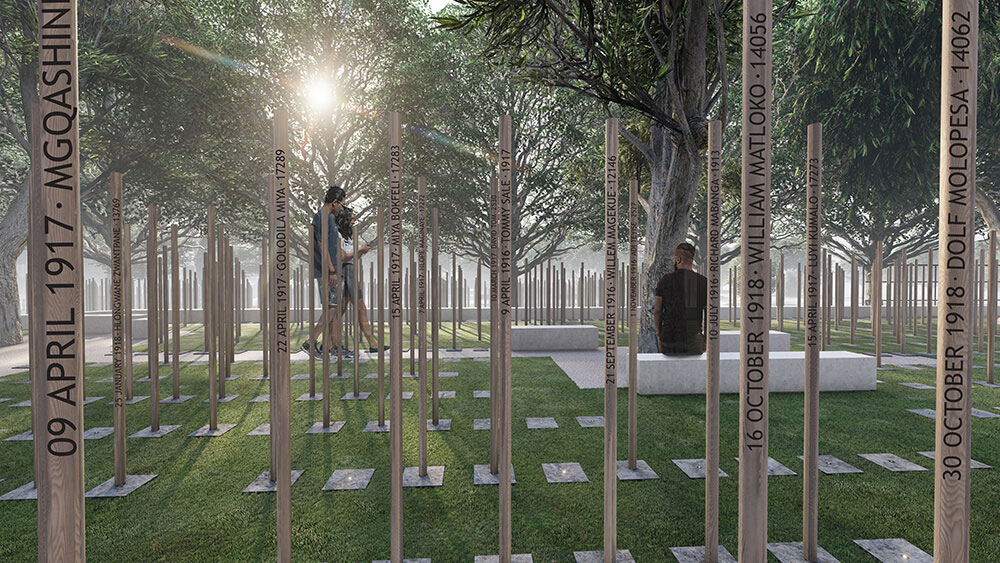
Get the latest updates on the incredible work of the Non-Commemoration Programme team.
Non-Commemoration
